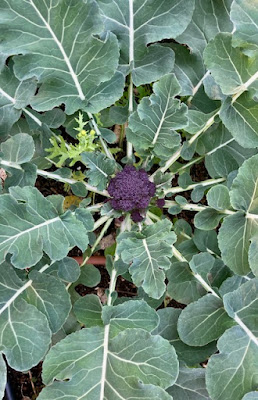There has been an abundance of rain this winter, especially in January. The soil is wet, heavy, fecund. The rain water gathers and forms small rivulets that meander down the slopes, gargling as they go.
Observing this life force is a walking prayer of awe and gratitude. Within seconds, I bend down to pull out a weed, and then another, and another. I crawl through garden beds, hands muddied, knees soaked, flinging grass and dandelions over my head.
I try to make made space around the bases of the trees and plants to give them light and nutrients that are hijacked by those uninvited weedy lodgers. It feels gratifying to have a tiny window of order and edge in this natural chaos, although with the next rain, those weed hijackers pop back. My weeding is a meditation practice. I hear bird song, touch and smell the rich soil, observe the insects busily working the earth and study new plants that shoot forth with incredible energy.
And as I weed-meditate, I think. I hear jets screeching over my head, the occasional helicopter headed to the border or, G-d forbid, to a hospital. I am weeding in a war zone, and I head to this garden like a therapy couch. I weed for today and I plant for tomorrow. I do not know what this day or the next will bring, but nature keeps sprouting for the future, and I will follow suit.
I often wonder if perhaps more people could benefit from being out here. Historically, the Jewish nation was connected to the land of Israel as farmers but were expelled. The European Jews once lived in small agricultural communities – and after the shtetls were obliterated, they fled to cities. And after time, they would always have to run for their lives.
In many places, they became trades people as they could not own land. In the contemporary Jewish world, most children grow up indoors in classrooms and tread the pavement of city streets and play in plastic playgrounds. Parents push strollers along concrete and buy food in plastic packages. But what about connecting to the Good Land that we pray for several times a day and mourn for and fast for?
Here I am, plucking weeds and thinking. When the Jews returned to this same land, the kibbutzniks were farmers. They worked hard preparing the soil, tilling, and planting and watched the land come back to life with abundance.
All I know is that this land is filled with the goodness of G-d and is yearning for us to reconnect. One interesting repercussion of this war is that farmers no longer have Thai workers to help (I also wonder why Israelis do not like to do this work so we must bring in foreign agricultural workers). I think Sri Lankans are on their way to help, but in the interim, there was a call for help which was answered by all; yeshiva students were out in the fields picking citrus fruit while middle-aged women were tending to the strawberry fields and picking ginger. And they loved it!
Other foreigners arrived to help, including eager American cowboys wearing Stetson hats. I met Chris the Farmer, who came here from Ohio to help permaculture farms. He is not Jewish and has never been to Israel, yet here he is during the war, stopping his own work for months so he can offer a helping hand to organic farmers. This is true, brave giving.
I weed and I wonder. There are so many Jewish laws that deal with the land, yet religious students study them on a page sitting in a building. After time, they become a thin line on paper as opposed to a living furrow of seedlings in the ground.
However, Judaism is connected to nature, and there is even a birthday just for the trees. On Tu B’shvat, which we celebrated one week ago, people plant trees, others enjoy fruit, nuts and wine at a seder, while most Jews know nothing at all about the holiday.
Tu B’shvat comes at a time of cold, wet, and darkness. Leaves have shed from the deciduous trees leaving them naked, vulnerable, and barren looking. Unlike the other Jewish holidays that celebrate miracles and salvations, Tu B’shvat mysteriously celebrates a seemingly ‘dead’ tree and fruit that is not even in season.
We are that tree. And especially now, during the darkness and tears of war, death, and hopelessness, we too must dig deep and connect to an inner light akin to that sap. When we eat the fruit, we must envision that future time of abundance and connection right now. And it can only come from darkness and pain, symbolic of the trees’ hibernation.
The rain is still falling as I weed and I am observing the tiny new buds forming on the branches. I pray for a future of peace and abundance and for all to connect to that inner tree.
And I envision a time when all with have the opportunity to connect with and ‘touch’ the beautiful Land of Israel with its budding trees, tap into its potential, and its miracles, hidden and revealed.







No comments:
Post a Comment
Your comments are always welcome.